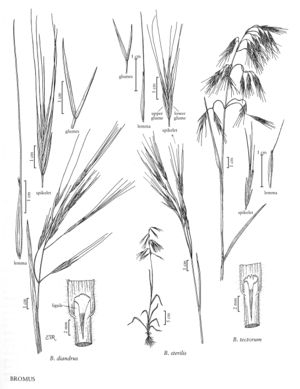Difference between revisions of "Bromus sterilis"
FNA>Volume Importer |
FNA>Volume Importer |
||
| Line 20: | Line 20: | ||
-->{{Treatment/Body | -->{{Treatment/Body | ||
|distribution=Wash.;Del.;D.C.;W.Va.;Pacific Islands (Hawaii);N.J.;N.Mex.;Tex.;N.C.;Tenn.;N.Y.;Pa.;B.C.;Ont.;R.I.;Nev.;Va.;Colo.;Calif.;Ala.;Oreg.;Ark.;Ill.;Ind.;Ariz.;Idaho;Conn.;Md.;Mass.;Ohio;Utah;Mo.;Mich.;Okla.;Miss.;Ky. | |distribution=Wash.;Del.;D.C.;W.Va.;Pacific Islands (Hawaii);N.J.;N.Mex.;Tex.;N.C.;Tenn.;N.Y.;Pa.;B.C.;Ont.;R.I.;Nev.;Va.;Colo.;Calif.;Ala.;Oreg.;Ark.;Ill.;Ind.;Ariz.;Idaho;Conn.;Md.;Mass.;Ohio;Utah;Mo.;Mich.;Okla.;Miss.;Ky. | ||
| − | |discussion=<p>Bromus sterilis is native to Europe, growing from Sweden southward. In the Flora region, it grows in road verges, waste places, fields, and overgrazed rangeland. It is widespread in western and eastern North America, but is mostly absent from the Great Plains and the southeastern states.</p> | + | |discussion=<p><i>Bromus sterilis</i> is native to Europe, growing from Sweden southward. In the Flora region, it grows in road verges, waste places, fields, and overgrazed rangeland. It is widespread in western and eastern North America, but is mostly absent from the Great Plains and the southeastern states.</p> |
|tables= | |tables= | ||
|references= | |references= | ||
| Line 41: | Line 41: | ||
|publication year= | |publication year= | ||
|special status= | |special status= | ||
| − | |source xml=https://jpend@bitbucket.org/aafc-mbb/fna-data-curation.git/src/ | + | |source xml=https://jpend@bitbucket.org/aafc-mbb/fna-data-curation.git/src/8f726806613d60c220dc4493de13607dd3150896/coarse_grained_fna_xml/V24/V24_317.xml |
|subfamily=Poaceae subfam. Pooideae | |subfamily=Poaceae subfam. Pooideae | ||
|tribe=Poaceae tribe Bromeae | |tribe=Poaceae tribe Bromeae | ||
Revision as of 17:19, 18 September 2019
Plants annual. Culms 35-100 cm, erect or geniculate near the base, glabrous. Sheaths densely pubescent; auricles absent; ligules 2-2.5 mm, glabrous, acute, lacerate; blades 4-20 cm long, 1-6 mm wide, pubescent on both surfaces. Panicles 10-20 cm long, 5-12 cm wide, open; branches 2-10 cm, spreading, ascending or drooping, rarely with more than 3 spikelets. Spikelets 20-35 mm, usually shorter than the panicle branches, sides parallel or diverging distally, moderately laterally compressed, with 5-9 florets. Glumes smooth or scabrous, margins hyaline; lower glumes 6-14 mm, 1(3)-veined; upper glumes 10-20 mm, 3(5)-veined; lemmas 14-20 mm, narrowly lanceolate, pubescent or puberulent, 7(9)-veined, rounded over the midvein, margins hyaline, apices acuminate, bifid, teeth 1-3 mm; awns 15-30 mm, straight, arising 1.5 mm or more below the lemma apices; anthers 1-1.4 mm. 2n = 14,28.
Distribution
Wash., Del., D.C., W.Va., Pacific Islands (Hawaii), N.J., N.Mex., Tex., N.C., Tenn., N.Y., Pa., B.C., Ont., R.I., Nev., Va., Colo., Calif., Ala., Oreg., Ark., Ill., Ind., Ariz., Idaho, Conn., Md., Mass., Ohio, Utah, Mo., Mich., Okla., Miss., Ky.
Discussion
Bromus sterilis is native to Europe, growing from Sweden southward. In the Flora region, it grows in road verges, waste places, fields, and overgrazed rangeland. It is widespread in western and eastern North America, but is mostly absent from the Great Plains and the southeastern states.
Selected References
None.
